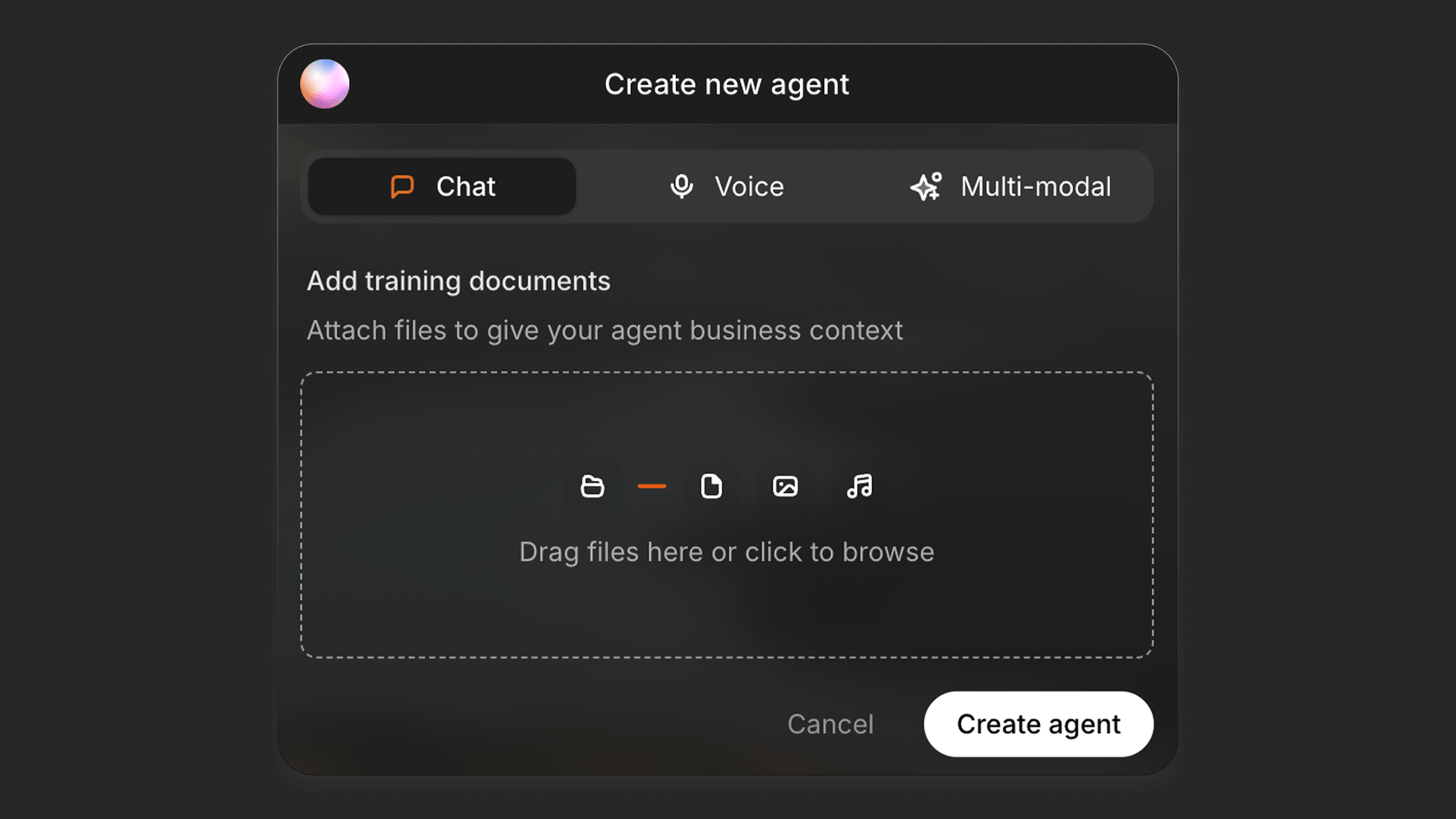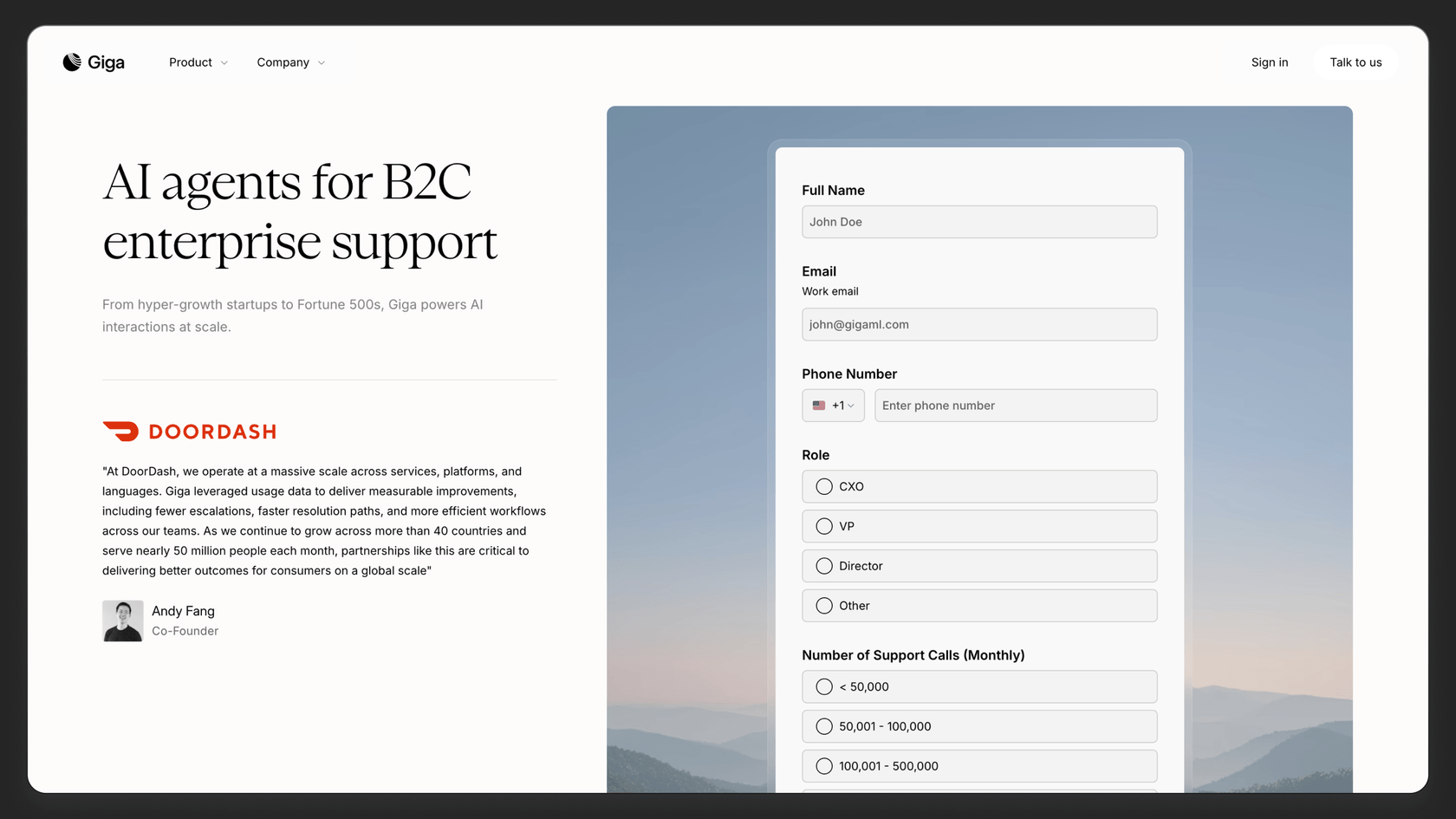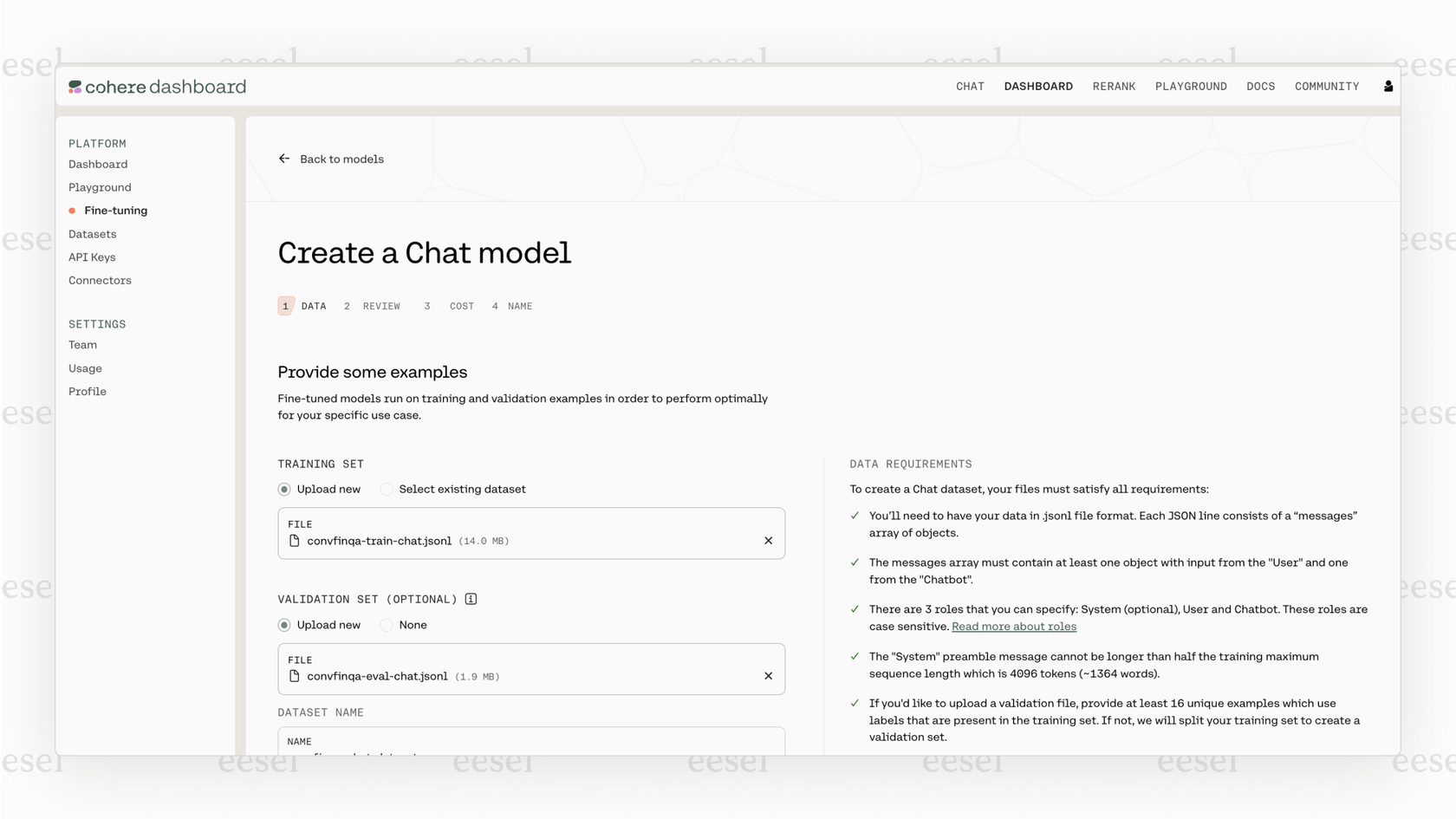The 5 best GigaML alternatives for enterprise AI support in 2025

Stevia Putri

Stanley Nicholas
Last edited December 21, 2025
Expert Verified

The buzz around enterprise AI is pretty hard to miss these days. Companies like GigaML, fresh off a massive $61 million funding round, are all over the news promising AI agents that can handle millions of customer calls with near-human empathy. It’s exciting, and it gets you thinking, right? How could this kind of tech change our own support operations?
But here’s the reality: the solution with the most hype isn't automatically the best fit for every team. Depending on your size, budget, and just how fast you need to get things done, a different tool might be a much better choice. That’s why I decided to do a deep dive and find the best GigaML alternatives out there. If you're looking for a powerful AI solution but need a better mix of speed, flexibility, and honest pricing, this list is for you.
What is GigaML? The baseline for GigaML alternatives
GigaML is an AI platform that lets you build and launch custom AI agents for customer support. The big promise is creating incredibly sophisticated agents that can manage complex conversations, especially over the phone.

Their pitch focuses on a few key pieces: an "Agent Canvas" for building out your agents, "Smart Insights" for analytics, and a voice experience that’s meant to feel natural and emotionally intelligent. They also say they can get you "up and running in two weeks," which tells you they’re aiming for large-scale, hands-on setups for big enterprise clients.
Why you might look for GigaML alternatives
While a custom-built, powerful AI agent sounds amazing on paper, it’s not always the right tool for the job. After digging in, I spotted a few practical reasons why a team might start looking for something else.
First off, there’s the need to move fast and do things yourself. Let's be real, a two-week setup that starts with a mandatory demo and sales call just doesn't work for teams who needed a solution yesterday. Some of us want to sign up, connect our tools, and see if it works in a matter of minutes, not wait around for a formal onboarding process.
Then there’s the money conversation, or the lack of one. GigaML’s pricing isn't public, which is usually code for "expensive and complicated." For anyone trying to stick to a predictable budget, platforms with clear, upfront pricing are a much safer bet. The last thing you want is a surprise bill because you had a busy support month.

Finally, not everyone is looking to throw out their entire workflow. A lot of us are happy with our current helpdesk, whether it's Zendesk or Freshdesk. The best AI solution should really be a smart layer that plugs into what you already use, not a "rip and replace" system that forces your team to learn everything from scratch. Being able to test an AI on your own historical data before it talks to a customer is also a huge plus. It lets you roll it out confidently without putting your customer experience on the line.
How we evaluated the best GigaML alternatives
To make this list actually useful, I focused on the things that matter to real-world support teams. It's not just about flashy features; it's about what brings value day in and day out.
-
Ease of implementation: How fast can you go from signing up to having a working AI? Can you do it all yourself, or are you stuck waiting for a sales demo?
-
Customization and control: Can you really control what the AI says and does? That means defining its personality, deciding which tickets it should handle, and connecting it to other tools for custom actions.
-
Knowledge source integration: How does it learn your business? Can it only read a public help center, or can it tap into the best source of knowledge you have: your past support tickets, internal wikis, and other documents?
-
Pricing model: Is the pricing clear and predictable? Or will you get hit with hidden per-resolution fees that actually punish you for being successful?
-
Testing and reporting: Can you safely test the AI in a sandbox before it goes live? And does it provide reports that help you actually get better?
GigaML alternatives comparison table
Here’s a quick snapshot of how the top GigaML alternatives compare at a glance.
| Feature | eesel AI | Vertex AI | Cohere | Zowie | OpenMic AI |
|---|---|---|---|---|---|
| Primary Use Case | All-in-one support automation | ML model development platform | Foundational LLMs for builders | E-commerce chatbot | Emotionally intelligent voice AI |
| Ease of Setup | Self-serve, minutes | Requires developers, complex | Requires developers, complex | Guided onboarding | Guided onboarding |
| Helpdesk Integration | One-click (no rip/replace) | Custom build required | Custom build required | Yes, primary focus | Yes, integrations available |
| Simulation Mode | Yes, on historical tickets | No | No | Limited | No |
| Pricing Model | Transparent, flat-rate tiers | Usage-based (compute, tokens) | Usage-based (tokens) | Contact for pricing | Per minute, tiered plans |
| Best For | Teams wanting speed & control | Enterprises with ML teams | Developers building custom apps | E-commerce brands | Voice-centric support |
The 5 best GigaML alternatives in 2025
1. eesel AI
eesel AI is my top pick because it brings enterprise-level power without all the usual enterprise headaches. It’s a self-serve platform that you can hook up to your existing helpdesk and knowledge bases in minutes. From there, you can automate support, give your agents a hand, and launch chatbots. It’s really built for teams that want to move quickly and stay in the driver's seat.

Why it's a top GigaML alternative
-
Go live in minutes: This is where it really stands out. While GigaML is talking about a two-week setup, you can connect eesel AI to your helpdesk with a single click and start seeing results almost immediately. No need to sit through a mandatory sales call to get started.
-
Total control and no "rip and replace": eesel AI works right on top of the tools you already use. It learns from your past tickets, Confluence pages, Google Docs, and over 100 other apps. You can use its simple prompt editor to dial in the AI's exact tone and behavior, and even set up custom actions to have it do things like look up order information or tag tickets automatically.
-
Risk-free simulation: Before the AI ever interacts with a customer, you can run it in a simulation mode over thousands of your past tickets. This gives you a clear forecast of your potential resolution rate and cost savings, so you can launch knowing exactly what to expect.

Pricing
The pricing for eesel AI is refreshingly straightforward. There are no fees per resolution, so your bill won't jump up unexpectedly.
-
Team Plan: $299/month ($239/month if billed annually) for up to 1,000 AI interactions. This includes the AI Copilot for agents, Slack integration, and training on your documents.
-
Business Plan: $799/month ($639/month if billed annually) for up to 3,000 AI interactions. This unlocks the full AI Agent, training on past tickets, custom actions, and that powerful simulation mode.
-
Custom Plan: For larger teams that need unlimited interactions, special integrations, and more complex workflows.
You can start on a monthly plan and cancel whenever you want, which is a level of flexibility you just don't see with most big enterprise platforms.
Best for
Businesses of any size that want to deploy a powerful, custom AI for support quickly and affordably, without having to change their existing workflows.
2. Vertex AI (by Google)
Vertex AI is Google's huge, do-everything machine learning platform. Think of it less as a plug-and-play support tool and more as a giant workshop filled with every single tool an AI developer could dream of. It’s designed for data science and engineering teams to build, deploy, and scale their own ML models from the ground up, including complex conversational AI.
Why it's a GigaML alternative
For massive companies with their own dedicated ML teams, Vertex AI offers practically unlimited power to build a completely custom AI solution.
Pros
-
It's incredibly powerful, scalable, and tied into the entire Google Cloud ecosystem.
-
You get access to Google's cutting-edge models, like Gemini.

Cons
-
This is not an out-of-the-box solution by any stretch. You'll need serious technical know-how, developer resources, and a lot of time to build something useful for a support team.
-
The pricing is wildly complex and based on how much of various computing resources you use.
Pricing
Vertex AI pricing is pay-as-you-go and can change a lot from month to month. You’re billed for everything from model training and deployment to predictions and data storage. For perspective, text generation with a Gemini model starts around $0.0001 per 1,000 characters, but that’s just one small piece of the puzzle. Expect to need a spreadsheet just to keep track of your costs.
Best for
Large enterprises with in-house ML engineering teams who are building their AI infrastructure from scratch.
3. Cohere
Cohere gives developers access to powerful, enterprise-focused Large Language Models (LLMs) through an API. It's not a ready-made support platform, but rather the foundational tech you'd use to build your own custom AI apps. Cohere also puts a big emphasis on data privacy and security, which has made it a go-to for companies in regulated industries.

Why it's a GigaML alternative
It's a solid option for tech-savvy companies that want the freedom to build a completely custom AI support tool using a secure and high-performing LLM as the engine.
Pros
-
High-quality language models built specifically for business use cases.
-
A strong focus on data security, with options to deploy in a private cloud or even on-premises.
Cons
-
Just like Vertex AI, it’s a developer toolkit, not a finished product for a support team. You have to build the entire application around their API.
-
It takes a lot of engineering resources to get it running and keep it maintained.
Pricing
Cohere has a free tier for developers to play around and build prototypes. For production, pricing is based on usage and calculated per million tokens the model processes. This is flexible, but could be unpredictable for support teams with high ticket volumes. You'll need to talk to their sales team for detailed enterprise pricing.
Best for
Developers and companies that need a powerful and secure foundational LLM to build their own AI-powered tools.
4. Zowie
Zowie is an AI customer service platform that is laser-focused on the e-commerce world. It provides AI-powered chatbots that are designed to answer common questions from shoppers about orders, returns, shipping, and products. It also integrates deeply with platforms like Shopify.

Why it's a GigaML alternative
Zowie is a direct competitor in the AI support space, but it has carved out a very specific niche in e-commerce, making it a very relevant alternative for any retail brand.
Pros
-
It's purpose-built for e-commerce, with deep integrations into major shopping platforms.
-
It can automate a lot of common retail-specific questions right out of the box.
Cons
-
It’s not as flexible if your business isn’t in e-commerce.
-
The pricing is hidden. You have to go through a demo and a sales process to get a quote.
-
You might not get the same level of detailed control over workflows as you would with more open platforms.
Pricing
You'll have to contact the Zowie sales team for a custom quote. This lack of transparency makes it tough to compare against other options without committing to a full sales cycle.
Best for
E-commerce businesses that want a specialized AI chatbot for handling common shopping-related questions.
5. OpenMic AI
OpenMic AI is a voice AI platform that centers on what it calls "emotional intelligence." The whole idea is to create empathetic, human-like conversations, mostly for handling phone calls. It tries to understand the feeling behind a customer's words and respond in a way that matches their tone.
Why it's a GigaML alternative
It comes at the problem from a unique angle by focusing on the emotional side of voice calls, which is a clear contrast to GigaML's broader, more process-oriented approach.
Pros
-
A strong, specialized focus on making voice conversations sound natural and empathetic.
-
Transparent, per-minute pricing plans make it easy to understand your costs.
Cons
-
Its narrow focus on voice means it's probably not the best fit for businesses that need to automate support across text channels like email and chat.
-
It’s more of a niche tool for voice automation than an all-in-one platform for support.
Pricing
OpenMic AI's pricing is tiered and based on how many minutes you use.
-
Starter: $29/month for 100 minutes.
-
Business: $199/month for 1,000 minutes (then $0.15/min).
-
Pro: $450/month for 2,500 minutes (then $0.13/min).
-
Agency & Enterprise: Custom plans are available for higher volumes.
While the pricing is transparent, a per-minute model can get expensive and unpredictable when call volumes spike.
Best for
Businesses that want to add a very personal, empathetic touch to their phone support.
How to choose the right GigaML alternatives for your team
Feeling a bit swamped by the options? Don't sweat it. Here are a few simple questions to ask yourself to find the right fit.
-
What does your workflow look like now? The best tool is one that makes your team's life easier, not harder. Look for something that plugs into the helpdesk you already use, rather than forcing you to move everything to a new system.
-
Can you try it risk-free? You wouldn't buy a car without test-driving it. Don't commit to an AI without seeing how it handles your actual data. A good simulation mode that runs on your historical tickets is the best way to see how it'll perform.
-
Is the pricing honest? Your budget is there for a reason. Choose a platform with a clear, predictable pricing model that doesn't penalize you for resolving more tickets. Flat-rate plans are your friend.
-
How fast do you need to see results? Be honest: how much time and how many people can you dedicate to this? If a multi-week, developer-heavy project isn't in the cards, look for a self-serve solution that can start helping on day one.

The best GigaML alternative is the one that fits your workflow
GigaML is obviously a powerful platform. For a certain type of huge company with deep pockets and a long timeline, it could be a perfect match. But for the rest of us, the market is full of fantastic alternatives that play to different strengths.
For teams that care about speed, control, easy integration, and predictable costs, a solution built for the realities of a modern support team is almost always the better call. It’s all about finding a tool that works for you, not one that makes you work for it.
If you want to see just how quickly you can get enterprise-grade AI up and running, one that learns from your own data and plugs right into your workflow, you should check out eesel AI. It was designed from day one to solve these exact problems.
Frequently asked questions
Q1: How quickly can I get started with these GigaML alternatives compared to GigaML itself?
A1: Many GigaML alternatives, like eesel AI, emphasize quick, self-serve setup, allowing you to go live in minutes. This contrasts with GigaML's typical two-week implementation process, which often involves mandatory demos and sales calls. Solutions like Vertex AI or Cohere, however, require significant development time.
Q2: What are the typical pricing models for these GigaML alternatives, and how do they compare to GigaML's approach?
A2: Unlike GigaML's non-public pricing, many alternatives offer transparent, predictable models like flat-rate tiers (eesel AI) or per-minute usage (OpenMic AI). Developer platforms like Vertex AI and Cohere have complex, usage-based pricing for compute and tokens. Look for transparent pricing to avoid unexpected costs.
Q3: Do these GigaML alternatives integrate with my existing helpdesk and knowledge base tools?
A3: Yes, many GigaML alternatives, especially eesel AI and Zowie, are designed to integrate seamlessly with popular helpdesks like Zendesk and platforms like Shopify. This allows them to learn from your historical data and plug into your current workflow without requiring a "rip and replace" strategy.
Q4: How much control or customization do I get over the AI's behavior with different GigaML alternatives?
A4: Platforms like eesel AI offer extensive control, allowing you to define the AI's tone, behavior, and custom actions through simple editors. Developer-focused GigaML alternatives like Vertex AI and Cohere provide maximum customization, but require in-house ML expertise to build and manage.
Q5: Are there any GigaML alternatives that offer a risk-free way to test the AI before it goes live to customers?
A5: Yes, eesel AI, for example, offers a unique simulation mode that allows you to test the AI on thousands of your past tickets. This feature provides a clear forecast of resolution rates and cost savings, enabling you to launch confidently with expected performance insights.
Q6: Which GigaML alternatives are best suited for businesses with specific needs, like e-commerce or voice support?
A6: Zowie is highly specialized for e-commerce, offering chatbots deeply integrated with platforms like Shopify. For voice-centric support with an emphasis on emotional intelligence, OpenMic AI is a strong GigaML alternative. eesel AI provides a versatile all-in-one solution for general support automation across various channels.
Ready to see how fast you can automate your support? Get started with eesel AI for free or book a demo to see it in action.
Share this post

Article by
Stevia Putri
Stevia Putri is a marketing generalist at eesel AI, where she helps turn powerful AI tools into stories that resonate. She’s driven by curiosity, clarity, and the human side of technology.




